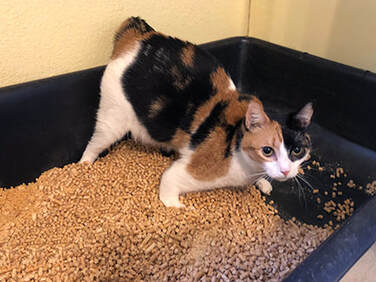
Frustrated by your favorite feline peeing outside the litter box? Wondering how to prevent it?
Because most cats urinate inappropriately for one of two reasons, medical or behavioral, the first step is a visit to your vet. The vet will perform a thorough physical examination of your cat and collect a urine sample to either rule in or rule out the following medical conditions:
Bladder stones: These stones can not only irritate the bladder but block it, and if your vet suspects they’re the cause, x-rays are essential in determining their size and number. While smaller stones may dissolve on a special diet, larger ones may need to be removed surgically.
Idiopathic cystitis: Cystits is an inflammation of the bladder, idiopathic means the cause is unknown, and cats with this condition often have blood in their urine. A urine sample is of utmost importance since the blood is often only detectable microscopically. If your vet finds blood in your cat’s urine with no sign of crystals, stones or bacteria, the likely diagnosis is idiopathic cystitis, and it’s usually treated through dietary changes and environmental enrichment, with pain and anti-anxiety medications often prescribed as well.
Metabolic disease: Among the metabolic diseases that may increase your cat’s urination are chronic kidney disease, liver disease, diabetes, and thyroid problems. If your cat has been drinking water more and/or you’ve been cleaning her litter box more often, mention this to your vet who may then run some blood work to see if one of the aforementioned issues is the culprit.
Urinary tract infections: An inflammatory response in the urinary tract caused by bacteria, UTI’s are treated with antibiotics. Once the antibiotics are finished, vets usually recommend follow-up testing to make certain the infection is gone. When one or more urinary issues are chronic, however, this is referred to as feline lower urinary tract disease or FLUTD. If your cat is diagnosed with FLUTD, your vet may recommend a special urinary diet and/or supplements to support the health of her urinary tract.
Urinary problems often lead to urinary obstructions, especially in male cats. If yours is “posturing” to urinate and little or no urine is being eliminated, he may have a blockage or partial obstruction. Because either condition can swiftly become life threatening, bring him to your vet immediately.
If, on the other hand, there are no medical reasons for your cat’s inappropriate urination, the cause is, most likely, behavioral. The usual suspects: a dirty or uncomfortable litter box, the location of the litter box or unappealing litter; stress due to the presence of another animal or a new person in your household, and the lingering scent of their own urine long after that soiled area has been cleaned up.
Consider, then, these solutions:
- Ensure your cat’s litter box is both comfortable and clean – the larger the better, and if possible, leave it uncovered.
- Place the litter box in a quiet yet accessible area of your home – far from where your cat eats and drinks – and preferably out of sight.
- If yours is a multi-story house, place a litter box on each floor.
- Use a shallow box or place a ramp at the entrance of the litter box to make it easier for older cats to access.
- Use an unscented, scoopable litter that most cats seem to prefer.
- Many vets recommend having two boxes in a single-cat household. Why? Because some cats feel best using one for urine and the other for stool.
- Thoroughly clean any areas where your cat has urinated with an enzymatic cleaner to eliminate all traces of the odor and, hopefully, discourage her from continuing to pee there.
- Last, but certainly not least, make your cat’s environment an enriched and happy one. Add both vertical and horizontal stimulants – from cat trees and wall ledges of varying heights to cat tunnels and puzzle games. Provide her with numerous toys to keep her constructively occupied and set aside some time each day to play, play, play with her.
If, however, these environmental changes prove ineffective, your vet may prescribe a medication to reduce her anxiety and stress.









 RSS Feed
RSS Feed